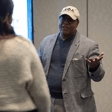Become a Creator today!Start creating today - Share your story with the world!
Start for free
00:00:00
00:00:01

26 | Building Leadership Through Philanthropy
Philanthropy is about more than money. It's about people and wanting to see a better world. When our fraternities and sororities engage in philanthropic partnerships and participate in our national programs, it should be about more than fulfilling requirements. It should be about leadership. This episode explores building that leadership through philanthropy.
"Ethocast" is presented by Edify Ventures, LLC.
Transcript
Introduction to Ethocast and Leadership Focus
00:00:03
Speaker
Welcome to Ethocast, a podcast about sound leadership practices to boost life in college fraternities and sororities. I'm Eddie Francis, presenter of Followership to Leadership and the Black Greek Success Program, presentations designed to help Greeks become more effective leaders. On Ethocast, I'll share lessons learned from my college days, my career journey, and leadership research.
Eddie Francis' Personal Leadership Journey
00:00:27
Speaker
Ethocast is a four-hour edification limited series and presented by Edify Ventures. This is Ethocast, leadership to the letter.
00:00:36
Speaker
ah Hey, thank you so much for joining me on this episode of Ethocast. I am Eddie Francis, how are you? How's mom?
00:00:47
Speaker
How's dad? are your people? All that good stuff. Ethocast, by the way, is brought to you by Edify Ventures. Show them who you are. Ask me today about public speaking coaching because public speaking can be a great indication of your personal brand.
00:01:06
Speaker
And also it can be your literal leadership coach. voice. Email me eddie at eddiefrancis.com today to ask me about public speaking coaching.
Philanthropy and Leadership in Fraternities and Sororities
00:01:21
Speaker
So when I was um really getting to know that wife of mine, one day she asked me a question.
00:01:33
Speaker
She asked me, what do you think about giving how do you see yourself as a philanthropist? And it kind of caught me off guard.
00:01:47
Speaker
um And I said, i ain't got no money.
00:01:53
Speaker
Well, she got me together on that point. I'll tell you all about it because one thing I have learned to do, thanks to that young lady, is I have learned to connect two very important dots.
00:02:09
Speaker
philanthropy, and leadership.
00:02:14
Speaker
The views expressed on EthelCast do not necessarily reflect the views of the hosts, guests, or any entities with which this podcast's participants are affiliated. Questions, comments, email eddie at eddiefrancis.com.
00:02:29
Speaker
Yeah. so um, no, this really happened. Um, my wife and I, when we were dating, she, um, one day somehow philanthropy came up in a conversation is because the, because she actually, Halima did research philanthropy as part of her doctoral dissertation.
00:02:50
Speaker
And so in talking about that, she just kind of out and asked me about my giving and what kind of philanthropist I saw myself as. And I'm going, I'm not a philanthropist. I don't have any money.
00:03:04
Speaker
And she asked me, well, have you ever volunteered for anything? Have you ever given anything? And I said, well, sure, I have. And she said, well, you can call yourself a philanthropist because philanthropy is not necessarily synonymous with money.
00:03:19
Speaker
I wasn't buying it, but you know what? She was the one with the PhD. I wasn't. So, hey, there's that. And um after talking to her for a little bit, I started to really, really get into this idea of not necessarily centering philanthropy on giving money, but finding a way to use giving to create dreams, to create a better society, to to to make myself even a better person.
00:03:53
Speaker
and And want to talk to you about that because in fraternity and sorority life, philanthropy is pretty pretty much built into any and everything that we do.
00:04:06
Speaker
But here's here's what I want to do. I want to take this step by step. So the first thing I want to do is I want to talk about philanthropy in a way that you probably have never heard anyone talk about it. The second thing I'm going to do is make that connection between philanthropy and leadership um so that you can both become ah more effective leader and you can become a more effective philanthropist.
00:04:33
Speaker
Believe me, it could really happen. So let's start with philanthropy. What exactly is it? So if you check out the definition, Merriam-Webster, you're going to see that is going to say goodwill to fellow members of the human race.
00:04:56
Speaker
When you look at the word philanthropy in its root, it comes from the Greek philanthropos, which means loving people. So at its core, we already hear that philanthropy is not about just money.
00:05:16
Speaker
As a matter of fact, the very root of philanthropy is about doing something for the betterment of humanity, the betterment of other people.
00:05:30
Speaker
Our fraternities and sororities, regardless of the council, A lot of our fraternities and sororities have national programs, national philanthropies.
00:05:42
Speaker
We have partnerships with national nonprofits. We have causes that we, um, that we have joined as organizations, but even the fraternities and sororities that don't have national programs, uh,
00:06:02
Speaker
There are fraternities and sororities whose chapters have local commitments that they have made in their local communities.
Personal Stories and Philanthropy Impact
00:06:10
Speaker
Now, there are those fraternity and sorority chapters that don't have national programs that have not made a local commitment. They have not created a relationship, a multi-year relationship with anyone.
00:06:22
Speaker
And I especially want you to listen if you happen to be a member of that kind of fraternity or sorority. So let's start our journey here with philanthropy.
00:06:33
Speaker
Let me ask you a question. What societal problems do you care the most about solving?
00:06:41
Speaker
Another question. What is the goodwill that you dream of seeing in the world?
00:06:49
Speaker
If you're in fraternity or sorority that has national partnerships, or you support national nonprofits or causes.
00:07:02
Speaker
Here's your question.
00:07:05
Speaker
Where do you see the connection between your love of humankind and the causes, the nonprofits, the partnerships that your fraternity or a sorority supports?
00:07:24
Speaker
For me, it was a very interesting um it it was it was a very interesting epiphany that I had. And mine came with the March of Dimes.
00:07:37
Speaker
As you know, I'm a member of Alpha Phi Alpha, and we have a partnership with the March of Dimes. We participate in the March for Babies. Years and years ago, when we were doing this whole thing, i would just do what I needed to do. I i would do whatever the chapter needed.
00:07:55
Speaker
Go out, raise whatever money needed to be raised. And then something interesting happened. I became a father. And in becoming a father, there was a point where mom, the situation was kind of touch and go with the kid.
00:08:13
Speaker
Stephen born doing great. He is almost 22 years old. He's in college. So he he is doing great. But that touch and go time was when I was really nervous.
00:08:28
Speaker
And so it made me look at the mark for babies differently because then i started thinking at some point, What about the families that, man, what about the families that that that haven't gotten to experience what I'm experiencing as a father?
00:08:50
Speaker
What about them?
00:08:52
Speaker
I started wondering what was preventable. I started taking more of an interest whenever we did our programming, whenever we you know did Project Alpha. and all I took more of an interest in those things.
00:09:10
Speaker
And that's where I found connection with that particular cause. And so when I started to go out and I did my part for March for Babies, I had a story to tell.
00:09:27
Speaker
And the story that I would tell the people to whom I would make my fundraising appeal was I have the opportunity to enjoy life with this wonderful kid of mine.
00:09:43
Speaker
There are other people who are not going to get that opportunity. And we're raising money for research so that we can make sure that families stay whole.
00:09:56
Speaker
To make sure that moms have healthy pregnancies. To make sure that families get to enjoy their children and the lives with their children. Like a lot of us get to enjoy ours.
Purposeful Giving and Leadership Aspects
00:10:11
Speaker
In that moment, when I made that appeal, I had that story to tell. i had a real reason to go to people. i had something compelling to talk to them about.
00:10:26
Speaker
But even more than that, I i had something relatable. It was real. It became much more authentic than it was before.
00:10:39
Speaker
And it did make a difference. And not only that, I was able to communicate to the other brothers in my chapter. Listen, this is how I've approached this thing.
00:10:52
Speaker
Here are some suggestions. I started to lead the effort a little bit. And I actually did become someone in the chapter when I really got into March for Babies. I actually became someone who was more of a voice when it came to it.
00:11:10
Speaker
And so when you think about the relationship that you have with your national programs, or you think about the relationship that you, your frat brothers and your sorority sisters have with your local community, and you see something, all that you want to, um you you you want to approach this issue or this cause, or you want to support this nonprofit, and You now have that part, that point of connection that can really help you articulate the importance of what it is that you're doing, the importance of that support.
00:11:50
Speaker
So there we go. Part one, part one. We have an idea of philanthropy. We have an idea of what it means, because the thing is, is that when philanthropists are giving, they're not just throwing money at a problem.
00:12:07
Speaker
Not all of them. There's some who might be doing it, but. They all have a story to tell about why it is. Why do they donate this money?
00:12:21
Speaker
The best example I can think of right now is there's Mackenzie Scott, who has given. Millions of dollars to historically black colleges and universities.
00:12:31
Speaker
And people have been asking, why is it that this white woman who is the ex of Jeff Bezos, why is she giving all of this money historically black colleges?
00:12:45
Speaker
And one day i so I knew the answer because I looked into it when she made a five million dollar gift to Dillard University where I was working as the director of communications and marketing. So I knew that I've known this story for five years.
00:12:59
Speaker
But a big part of the story is the respect that she has for the story of black folks. And a big part of that connection is the author, Toni Morrison.
00:13:10
Speaker
and there And the story goes deeper than that. So she became this social justice minded person. And a lot of her social justice, a lot of her giving has to do with wanting to make sure that nonprofits, historically black colleges and universities have an equitable, they they have an equitable foundation So that they can do the work that they need to do.
00:13:37
Speaker
Now, there's something that's very important to understand about this. Mackenzie Scott, I don't think, is trying to rescue anyone. What she's doing is she's investing in the promise.
00:13:52
Speaker
She's investing in the promise to educate people to, once again, create social equity. She's investing in a direction. That is philanthropy.
00:14:04
Speaker
It is beyond her love of humankind. it is also her It is also her investment. And you're going to see this with a lot of other folks. Robert F. Smith, 2019, he paid off the debt of the class of 2019 in Morehouse College.
00:14:23
Speaker
If you listen to his commencement speech leading up to the announcement of the gift, What he did is he talked about his past, what education had done for him.
00:14:35
Speaker
And he talked about what happened when he had an opportunity, because that opportunity was set up by someone else. When someone paid it forward to him. And so when he told that class, because I've watched this commencement speech three times, what he told that class is just like someone gave me a foundation and an opportunity, they paid it forward to me.
00:14:58
Speaker
I'm going to pay it forward to you. I'm going to give you a foundation and I'm going to get you out of debt right now, at least with your school.
Enhancing Leadership in Greek Life
00:15:10
Speaker
So let's put a pin in that. Let's think about that very, very quickly about not just giving to give, but giving with purpose. having a dream, going back to that question that I asked a little while ago, what societal problems do you care most about solving?
00:15:27
Speaker
What is the goodwill that you dream of seeing in this world? And I'm going to add another question based on what I just told you, what investment do you want to make in a better world? So this is where you start to lead.
00:15:41
Speaker
Now, Let's just set a baseline here. At its core, there are three elements that we take a look at when we look at leadership. Leadership studies tells us that the three elements that really make a difference and really help define leadership will be number one, the process in which someone or a group of people are influencing others.
00:16:08
Speaker
The second part is that you have the leaders and the followers who have an awareness of their relationship with one another.
00:16:17
Speaker
The third part. is that there is an effort to achieve some kind of objective through change. So when I think about how I started to become more of a voice um when it came to March for Babies in the alumni chapter that I was a member of at the time, ah this this all makes sense because the I wanted to influence my brothers to really see the commitment we needed to make
00:16:50
Speaker
to Marshall babies. But then i was also very aware of the fact that if I was going to make this happen, then I had to have relationships with the brothers throughout the chapter.
00:17:01
Speaker
I had to, I had to be someone that they were willing to listen to someone that they were willing to make the investment with someone they were willing to jump in there. with But then there was an objective.
00:17:16
Speaker
I did create fundraising goals. I made it very small at first. I said, hey, brothers, let's just raise $2,000. And so that was the objective that happened with that. So the great thing about fraternity and sorority life is that we have missions, we have values, we have aims, and these serve as launching paths for us to lead in the first place. By the way, you are listening to Ethocast. I'm Eddie Francis. I am your host. And we are talking about
00:17:46
Speaker
We are talking about not just doing philanthropy, but building leadership skills through philanthropy and how you can make that happen with your chapter. By the way, I do a whole presentation ah for this.
00:18:01
Speaker
It's called Give Till It's Built. Give Till It's Built. You can check out my website, eddiefrancis.com to learn more about Give Till It's Built and bringing it to your campus.
00:18:12
Speaker
So when you take a look at what happens with these leadership skills, here are three things that you can do to lead your chapter and to become more effective in your philanthropy.
00:18:25
Speaker
Number one, communicate. Number two, collaborate. Number three, moderate. Communicate. Tell people what the dream is.
00:18:36
Speaker
Paint the picture. Let them know why they need to be a part of it. Sell this thing to them. And then ask for their help.
00:18:49
Speaker
That seems to be the part that a lot of us leave out of this whole thing, especially in fraternity and sorority land. We have this perfectionism thing that is just, it it we do the most with it.
00:19:02
Speaker
But you don't have to. We're frat brothers, sorority sisters. We're supposed to work with one another. So the first step you take in building your leadership skills through philanthropy is to communicate the dream, communicate the goals, and then collaborate.
00:19:27
Speaker
Build a team to help you. I will tell you that One of the frustrating things at first when I started this whole thing with March for Babies is I did feel that I was kind of alone, even though I did communicate with the brothers.
00:19:43
Speaker
they yeah they They kind of sort of maybe kind of bought in and, you know, it's like, OK, it was a national program. We need to do it. So I had to build a team of people who were.
00:19:56
Speaker
I knew they would lead the effort, especially when I saw this one brother who was raising, who's doing a really good job of raising money. I said, okay, cool. I really, really, really need to get with him because he's going to raise the most money.
00:20:08
Speaker
And so I started to figure out what that collaboration would look like. So within your chapter, build that core team that's going to help you start achieving the dream.
00:20:24
Speaker
And then the third part. moderate. Okay. Check this out. This this is going to, you know, it's going to take a minute. um
00:20:34
Speaker
Try to make it as easy as possible for people to join the philanthropic efforts, you know? And what I'm talking about is, yes, you want to do it within your chapter, but then when your chapter starts to make the appeal externally,
00:20:50
Speaker
You know, if you're a college chapter, you start to make that appeal externally on your campus to people. Right. You have to go. You have to moderate this process.
00:21:03
Speaker
Let them know how easy it is to make it easy to give. First of all, first of all, make it easy to give. But then let them know. Communicate to them how easy it is to give. It's the click of a button.
00:21:17
Speaker
We're going to send you a text. Just hit the link and give. Right. Let them know it's only going to take them a couple of minutes. Or if you have something like, you know, um you know, pie, a Chi Omega, pie and Omega, um pie, a SIGEP, or if you have pie, a Kappa or something like that. If you have one of these types of events that you're going to do.
00:21:48
Speaker
Make it fun. That's part of the moderation as well.
00:21:53
Speaker
One of the things that March for Babies does that is so great. And by the way, March for Babies isn't paying for any of this. So um do support. um But one of the things that March for Babies does that is really good um over the years, they've made it a competition.
00:22:09
Speaker
So as you have heard, maybe on this podcast, my wife is a Zeta. And ah so Zeta Phi Beta does a March for Babies. Alpha Phi Alpha does a March for Babies. Sigma Gamma Rho. I can't remember who else does March for Babies.
00:22:23
Speaker
But just between us and the Zetas, there's this thing where we have created, a lot of the chapters have created some really healthy competition with one another. Well, March for Babies moderated that.
00:22:37
Speaker
Right. you You have the leaderboards that you can go check out. You have your dashboard. You chi go you go check it out. I was like, wait a minute. Who has been given? Who has been given more than our chapter is not right.
00:22:53
Speaker
So those are three things you can do to really start building the leadership skills, to really start improving your leadership. You communicate with folks, you collaborate with folks, and you moderate the process of giving to make sure that people are doing it. Now, the thing is, is that The ultimate thing that you want to be able to accomplish in your leadership is you have some mechanics of this process. And I talk about these mechanics in detail with Give Till This Built.
00:23:23
Speaker
But the first thing is identifying the resources, right? Again, it's not just about money. um Time is an important resource. Knowledge is an important resource. Talent is an important resource.
00:23:35
Speaker
So identify the resources that will boost your giving. And then... Create sustainable solutions. Now, if you have a national partnership or if you have a national nonprofit that your fraternity or sorority supports, then that sustainable solution piece, that is all done at the top. It filters down into the chapters, but the chapters are responsible for helping to make sure that that partnership or that support is sustainable.
00:24:07
Speaker
And also, they've already looked into what the sustainable solution is. So March of Dimes has already looked into this. They already know what needs to be done in order to make sure that there are healthy births.
00:24:20
Speaker
And they know what the sustainable solution is. They just ask the rest of us to come in and join them. But what about if you are one of these chapters that doesn't have a national program, your fraternity or sorority doesn't have a national program.
00:24:34
Speaker
And so you are at a point where you have to figure out what a sustainable solution looks like. So what do you do? So don't do just the immediate thing, the immediate event or whatever that you do this semester or next semester.
00:24:50
Speaker
Okay. Okay. Figure out how there's going to be some succession, especially if you have had a great effort and a nonprofit that you supported is really happy with you.
00:25:02
Speaker
How do you hand that off to the next set of chapter officers coming in? But then also, how do you hand it off so that it is a much more significant effort within your community?
00:25:15
Speaker
And then the third thing, this kind of speaks for itself, is to analyze the results.
The Essence of Philanthropy and Closing Thoughts
00:25:21
Speaker
So when we take a look at philanthropy, we know that we are not just giving money. Philanthropy is much, much more than that.
00:25:33
Speaker
Philanthropy is all about doing goodwill. making sure that you build something for the betterment of your community, the betterment of your campus, making sure that you you you put a dream out there, and then also making sure that you try to create something that is that is meaningful to you, meaningful to your fraternity brothers, meaningful to your sorority sisters.
00:26:03
Speaker
But in doing that, you have got to lead the effort. And you lead the effort by realizing that you, number one, you have to be able to have some influence with people.
00:26:15
Speaker
You have to have a relationship between the leaders and the followers and the effort. And there's a goal. There is some sort of goal that you have got to meet to make it all happen.
00:26:27
Speaker
If you have any questions about this, and again, if you want to learn more information about Give Till It's Built, email me eddie at eddiefrancis.com, eddie at eddiefrancis.com.
00:26:38
Speaker
I also wrote about philanthropy in the book From Letters to Leaders. ah That is a book that I did with my good friend, Mike Aylan from Greek University. Of course, I am a speaker with Greek University, so I got to give him props and that book is from letters to leaders, perseverance, and how to be a great fraternity or sorority alumnus.
00:27:00
Speaker
You want to find out more about that book, then make sure you go to greekuniversity.org. I have a page there. um So that's greekuniversity.org. My page is greekuniversity.org slash Eddie.
00:27:12
Speaker
All right. It has been real. It has been cool. Thank you. Especially if you have stuck, if you stuck with me through this thing, you have a good one and I'm going to see you Next time, Ethocast is a for our edification limited series. If you like what you heard, like and follow this podcast for more leadership insights for your fraternity or sorority chapter. To find out how you can bring followership to leadership or the Black Greek Success Program to your campus or a campus near you, email today, eddy at eddyfrancis.com. Until next time, spread brotherly and sisterly love wherever you go.



















